Real Estate Tokenization Platform Development: Transforming Property Investment for the Digital Age
May 16,2025
Real Estate Tokenization Platform Development: Transforming Property Investment for the Digital Age
The real estate sector, traditionally characterized by high capital requirements and lengthy timelines, is experiencing a significant shift. Through the tokenization of real estate—the process of converting ownership of real properties into digital tokens on the blockchain—we are able to create numerous opportunities for real estate investors, developers, and everyday people alike. The tokenized real estate market could grow to $16 trillion by 2030, as a result of blockchain’s ability to democratize access, improve liquidity, and increase processing speed.
In this blog, we will discuss how real estate tokenization is revolutionizing the way we invest in real property, the technology that fuels it, and why it is the future of real estate.
What is Real Estate Tokenization?
Tokenization Real estate is providing ownership rights for a property in the form of digital tokens on the blockchain. Each token represents a fractional ownership share in the property. Real estate can now be bought, sold or traded in digital tokens, reducing transaction cost, facilitating fractional ownership, and improving liquidity.
With the use of blockchain technology, real estate tokenization systematically improves the transaction process by lowering costs associated with real estate transactions, to widen the pool of investors.
What is the Purpose of Real Estate Tokenization?
By tokenizing real estate, we can digitize ownership of real estate assets by using blockchain-based tokens. The tokens represent a ownership stake in a property that can be bought, sold and traded just like stock, that will result in a more seamless, liquid and efficient approach to real estate investing.
Overall, the aims are:
- Fractional Ownership: Investors can buy a small portion of property instead of the whole property, decreasing the barriers to entry.
- Increased Liquidity: Divided tokens can be traded on a secondary market to provide liquidity in a traditionally illiquid asset like real estate.
- Global Access: Foreign investors can invest in property without the complications of their own legal complexities or logistics.
- Transparency & Security: Blockchain allows ownership records, transactions, and rights to be secure, tamper-proof, and auditable.
- Increased Transaction Times and Reduced Costs: Smart contracts can automate rent distributions and ownership changes, decreasing the administrative burden and middlemen.
- Efficient Fund Raising: Real estate developers can raise funds via token sales in a quicker fashion than traditional funding sources.
Top Trends 2025 in Real Estate Tokenization
A significant shift in the acceptance of real estate asset tokenization is happening globally. According to an EY-Parthenon survey, real estate portfolios may increase allocation to tokenised assets from approximately 1.3% in 2023 to around 6.0% by 2027 and beyond, reflecting growing investor confidence in tokenised real-estate investments.
At the same time, the same study found broader tokenised-asset allocations (across all sectors) of about 5.6% for institutional investors and 8.6% for high-net-worth individuals by 2026—highlighting the wider momentum behind tokenisation.
How Real Estate Tokenization Works?
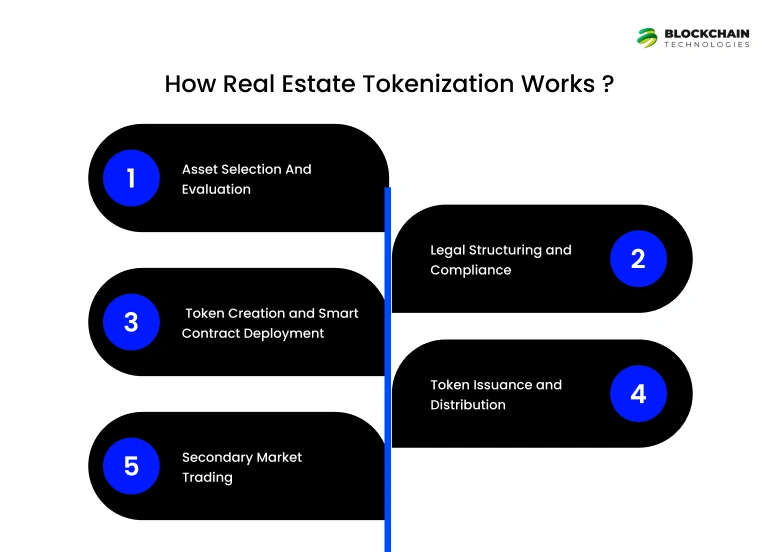
Real estate tokenization is the conversion of an ownership interest in a real property into digital tokens on a blockchain, enabling fractional ownership and greater liquidity. Each step in that process is outlined below:
1. Asset Selection And Evaluation
The first step is determining what type of property you want to tokenize for investors. It could be a residential, commercial, or industrial type of real estate. These are some of the key issues:
- Property Type: Is the real estate asset residential, commercial, or are we tokenizing an industrial asset?
- Location: Consideration on what jurisdiction the real estate asset is located and if there is market demand for real estate in that location.
- Legal Status: You need to determine that the real property has a clean title deed, and is free of any legal disputes.
- Valuation: The real property you intend to tokenize is worth asking what its current market value is or to do a full appraisal on it.
This step ensures that the property can actually be tokenized in a way that makes sense for the investors if they end up being interested.
2. Legal Structuring and Compliance
Having a good legal structure in place is important in order to make sure the tokenization process is within the law. This includes:
- Entity Setup: Creating a legal entity such as a Special Purpose Vehicle (SPV) to hold the asset.
- Legal Compliance: Making sure to abide by the rules and regulations of securities law in relevant jurisdictions.
- Defining Rights: Explaining the rights and responsibilities of token holders, including profit sharing aspects, governance, etc.
This step ensures that the property can actually be tokenized in a way that makes sense for the investors if they end up being interested.
3. Token Creation and Smart Contract Deployment
In this stage, digital tokens that represent ownership interests in the asset will be created and acknowledged through the use of smart contracts:
- Blockchain: Choosing a blockchain platform (Ethereum, Polymesh etc.) based on scalability, security and compliance offerings.
- Token Standards: Using token standards such as ERC-20 and ERC-1400 with compliance/interoperability.
- Smart Contracts: Building smart contracts to automate specific functions such as dividend payouts, voting rights, transfer restrictions etc.
This stage ensures the tokens are secure, ready to function, and comply with applicable regulatory standards.
4. Token Issuance and Distribution
When tokens have been issued, they could be offered to investors in several ways:
- Initial Offering: Undertaking a Security Token Offering (STO) or similar fundraising mechanism to offer tokens to investors.
- Platform Listing: Listing the tokens on best real estate tokenization platforms (e.g., tZERO, MERJ Exchange) to allow investors to access a larger market.
- Investor Onboarding: Investors will be required to undergo Know Your Customer (KYC) and Anti-Money Laundering (AML) processes to verify their identification.
This phase provides the ability to initially distribute tokens and our first opportunity for secondary market trading.
5. Secondary Market Trading
After the initial token issuance, it is possible to do secondary market trading, which provides liquidity:
- Listing on Exchanges: Tokens, subject to eligibility, may be listed for trading on regulated exchanges or decentralized platforms so that investors can buy and sell tokens.
- Providing Liquidity: Market makers and/or liquidity pools can be created to promote trading and to stabilize prices of the assets offered for trading.
- Monitoring for Compliance: Ongoing monitoring will ensure that all regulatory requirements pertaining to secondary trading are met, such as observing non-existent token ownership and identification requirements in any transactions.
Secondary market trading enables investors to have an active exit strategy, and they can always exit their investment at their pace, if they choose to.
Key Features of Tokenized Real Estate Platform
Tokenized real estate also has unique characteristics that improve the current method of investing in real estate:
- Fractional Ownership: enables individuals to own all or part of a property, lowering the amount of capital needed to invest in a property.
- Improved Liquidity: tokens may also be traded on secondary markets, allowing individuals to enter, change, or exit positions more freely and with less friction.
- Access to International Markets: Now, qualified investors from around the world can invest in a property market that has historically been inaccessible to them.
- Automated compliance: Smart contracts will often automate legacy compliance to reduce the admin work required on the part of any issuer of a tokenized asset – essentially allowing for frictionless compliance.
How Tokenization is Transforming Real Estate Investment
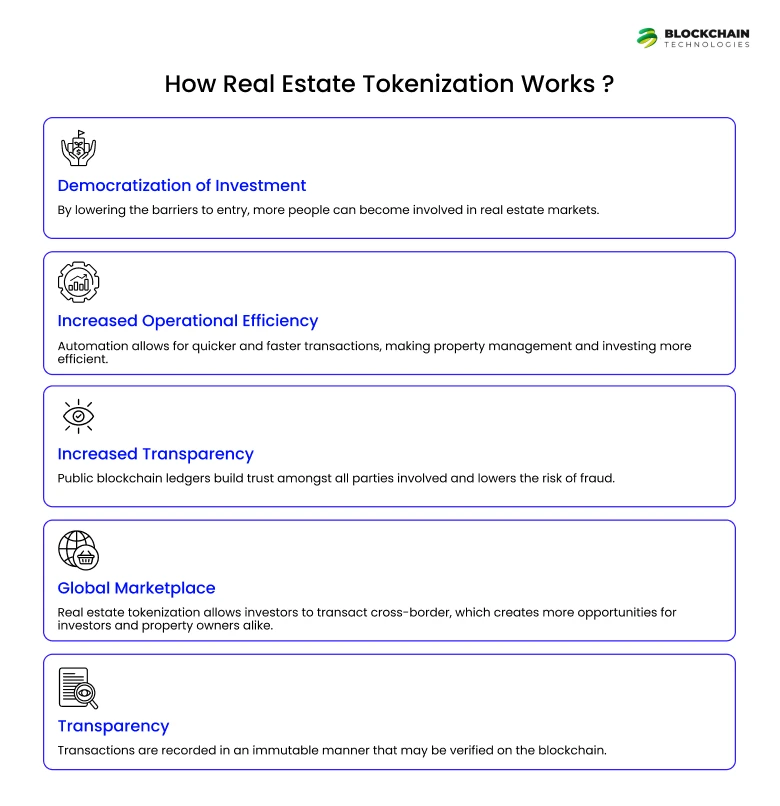
Blockchain technology’s arrival in real estate is changing the industry like never before:
- Democratization of Investment: By lowering the barriers to entry, more people can become involved in real estate markets.
- Increased Operational Efficiency: Automation allows for quicker and faster transactions, making property management and investing more efficient.
- Increased Transparency: Public blockchain ledgers build trust amongst all parties involved and lowers the risk of fraud.
- Global Marketplace: Real estate tokenization allows investors to transact cross-border, which creates more opportunities for investors and property owners alike.
- Transparency: Transactions are recorded in an immutable manner that may be verified on the blockchain.
Unlock the Future of Real Estate Today!
Ready to transform your property portfolio? Explore tokenization with Nadcab Labs, a leader in real estate asset tokenization development.
Advantages of Real Estate Tokenization Platform Development
The advantages of real estate tokenization are multifaceted:
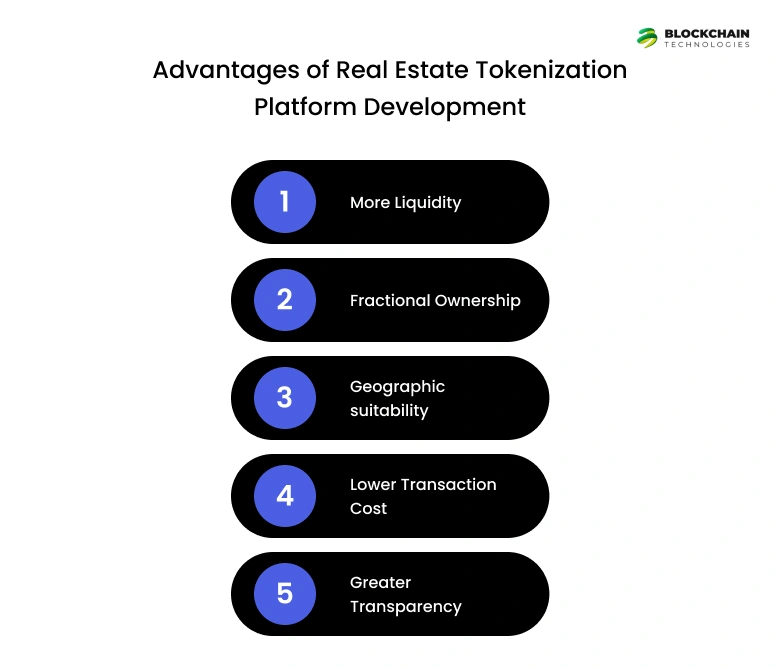
- More Liquidity: Tokens can be traded in secondary markets that allow investors to enter and exit a position with more ease.
- Fractional ownership: Less capital is needed in order to own a portion of a property.
- Geographic suitability: Investors in other parts of the world can now invest in real estate markets that they could not before.
- Lower Transaction Cost: Savings arise from automation and reduced intermediaries.
- Greater Transparency: Blockchain technology provides an immutable ledger and transparent record keeping.
Best Real Estate Tokenization Services and Companies
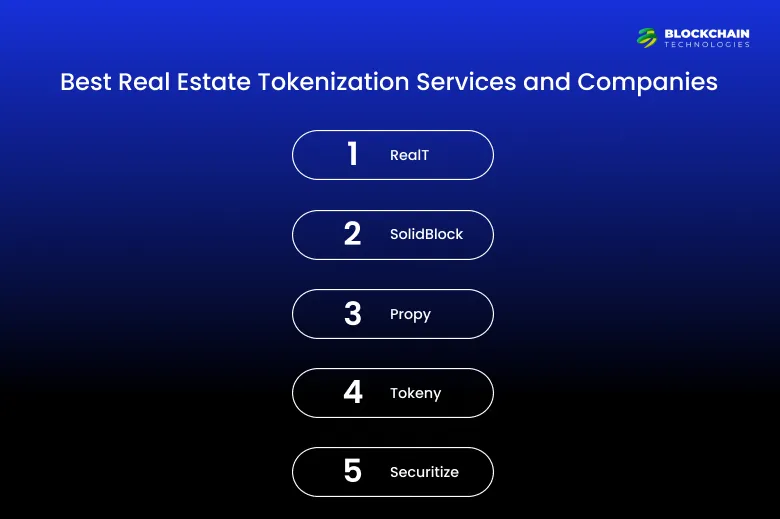
There are a number of emerging real estate tokenization companies:
1. RealT
Focus: Retail Rental Properties
Notable Features:
- $50 minimum investment
- Daily stablecoin payouts
- Ethereum-based
2. SolidBlock
Focus: Luxury/Commercial Real Estate
Notable Features:
- End-to-end compliance
- White-label solutions for developers
3. Propy
Focus: Cross-Border Transactions
Notable Features:
- NFT-based ownership
- Government partnerships
4. Tokeny
Focus: Institutional Compliance
Notable Features:
- Multi-chain support
- KYC/AML automation
5. Securitize
Focus: Development Projects
Notable Features:
- AI-driven regulatory reporting
- Fractionalized debt/equity offerings
Use Cases & Real-World Examples of Real Estate Tokenization Platforms
1. Democratizing Access To High-Value Assets
Example: St. Regis Aspen Resort (Elevated Returns/SolidBlock)
In 2021, Elevated Returns partnered with SolidBlock to tokenize the St. Regis Aspen Resort, raising $18 million through their strategy. The two projects divided the luxury property into digital shares, which they issued to investors on the tZERO platform. Investors received dividends from rental income, and their token had appreciated approximately 30% over 18 months, showcasing tokenization of institutional-grade real estate assets.
Platform Highlight: RealT
RealT enables retail investors to purchase tokens and invest in U.S. rental properties for as little as $50. RealT has over 970 rental properties tokenized,885,000, it earns daily rental income, paying out in stablecoins. Given it operates on Ethereum, it offers structure compliance and ease of secondary trading.
2. Commercial Real Estate and Institutional Adoption
Example: Kin Capital’s 100MDebtFund Kin Capital launched a real estate debt fund on the Chintai blockchain in 2025 and is targeting institutional investors with a minimum of 50,000. The fund involves the tokenization of loans and securitizations, allowing for automated compliance and capital calls with smart contracts.
Platform Highlight: Tokeny
Targeting institutional clients, Tokeny provides compliant security token issuance and management, especially for regulated markets. Tokeny’s platform is based in Luxembourg and supports multi-chain interoperability (e.g., Ethereum, Polkadot) while offering a KYC/AML protocol as a regulated leader.
3. Cross-Border Investment and Liquidity Pools
Case Study: RealEstateMall, UAE
RealEstateMall, based in Dubai, is tokenizing luxury properties throughout the Middle East and Asia. Investors from around the world purchase fractional shares and stake tokens for additional rewards, fusing DeFi concepts with real estate. The ability to function across multiple blockchains (Ethereum, Binance Smart Chain) allows for seamless cross-border transactions.
Platform Spotlight: Propy
Propy uses NFTs for property ownership, allowing for digital transactions. In 2024 it sold a home in Florida as an NFT, automating title transfer process and drastically reducing the timeline from several weeks to hours. They also work with governments to align blockchain data with land registry records.
4. Tokenization of undeveloped land and projects
For example, T-RIZE Group’s CA$300M Canadian Development
T-RIZE tokenized equity and debt for a 960-unit residential project in Canada. Funding came in from investors all over the globe. Tokenization allowed funding to be staggered over the project life cycle. Funding started with the land acquisition, then went to construction, etc. and provided performance updates in real-time.
Platform Highlight: Securitize
Securitize specializes in tokenizing real estate development projects. Its platform has automated regulatory reporting and investor accreditation, which reduces 30% of administrative expense for issuers.
5. Secondary Market Innovation
For example: The RedSwan tokenized commercial properties
RedSwan tokenized $2.2B of commercial real estate, including office towers and retail space. The tokens trade on decentralized exchanges, providing liquidity that commercial real estate has historically lacked. Investors can now get out of positions in minutes and not months.
Platform Highlight: tZERO
tZERO operates a hybrid exchange that bridges blockchain with traditional markets. It issues security tokens for St. Regis Aspen and other assets, provides institutional-grade custody and compliance.
Challenges and Factors to Consider for Real Estate Tokenization
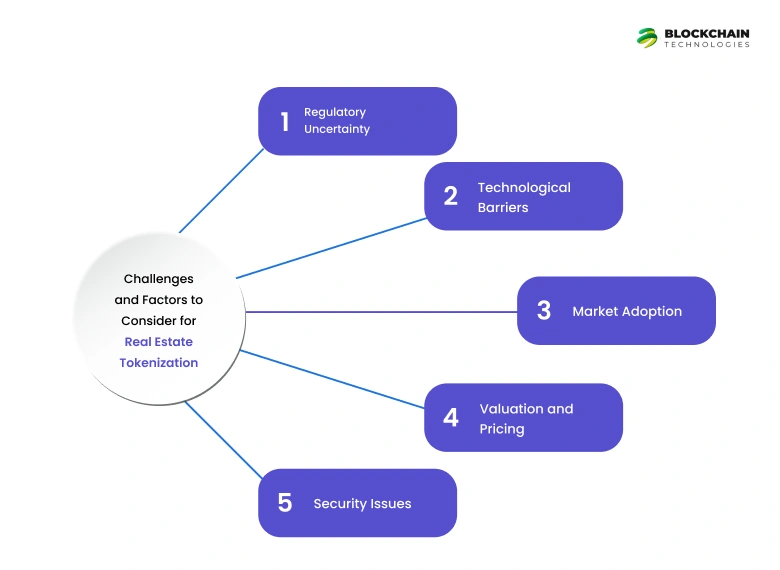
While promising, tokenization of real estate is marred by many challenges:
- Regulatory Uncertainty: Different regulation in different jurisdictions may make it difficult to undertake tokenization.
- Technological Barriers: Execution of blockchain-based solutions demands specialized technical knowledge and infrastructure.
- Market Adoption: Bringing investors and stakeholders on board would demand educating them.
- Valuation and Pricing: Having standardized procedures for valuing tokenized assets is still an issue.
- Security Issues: Maintaining the security of digital tokens and platforms is of utmost importance to safeguard investor assets.
Ready to Embrace the Future of Real Estate Investment?
Discover how our real estate tokenization development services can transform your property assets into digital tokens, opening doors to global investors and enhanced liquidity.
Final Thoughts: Tokenization is the Future of Real Estate Tokenization
The property sector is on the threshold of a blockchain-driven revolution. Real estate tokenization is not a speculative idea anymore—it’s a fact transforming the way we invest, buy, and sell real estate. By dismantling liquidity, accessibility, and transparency hurdles, this technology is making wealth creation accessible to millions of people, ranging from Wall Street professionals to first-time buyers in the emerging markets.
At Blockchaintechnologies, we’re not just observers of this transformation—we’re its architects. As a top real world asset tokenization platform development company, we’ve pioneered secure, compliant, and scalable solutions that empower developers, asset owners, and investors to thrive in the digital economy.
Transform Your Real Estate Vision into Digital Reality
Ready to unlock liquidity, attract global investors, and future-proof your assets?
Partner with Blockchaintechnologies—the #1 Real Estate Tokenization Service Provider
FAQs
Asset tokenization is the act of translating rights of ownership in a physical asset, such as real estate, into digital tokens on a blockchain to enable simpler and more effective transactions.
Real estate tokenization is a process of developing digital tokens representing ownership shares in a property, which could be purchased, sold, or exchanged by investors, hence making fractional ownership and liquidity possible.
Yes. We are creating a minimum viable product (MVP) to hit the market fast and build features from there based on market demand and customer feedback.
The cost can vary widely based on complexity, features, and compliance requirements of the platform. Development costs are typically between $15,000 to more than $200,000. Platforms with basic features and requirements can begin at around $5,000, while advanced platforms with complete functionalities can cost more than $200,000
At Blockchaintechnologies we value transparency and customer satisfaction. You can rest assured that there are no secret charges associated with our services. To give our clients additional peace of mind, we provide complimentary maintenance support for 8 weeks after deployment to ensure a seamless integration and resolve any initial issues.
The purpose of tokenization is to convert ownership of physical or intangible assets—like real estate, art, or securities—into digital tokens on a blockchain. This process allows for easier transfer, fractional ownership, and broader investor access while reducing costs and improving transparency through automation and secure digital records.
Tokenization is important because it revolutionizes how we invest, trade, and manage assets. By digitizing ownership, tokenization enables:
- Fractional investing
- lowering entry barriers
- Global access allowing international participation
- Faster transactions via smart contracts
- Enhanced liquidity through secondary markets
- Increased transparency with immutable blockchain records
InThis makes tokenization a powerful tool for democratizing finance and unlocking value across industries.
